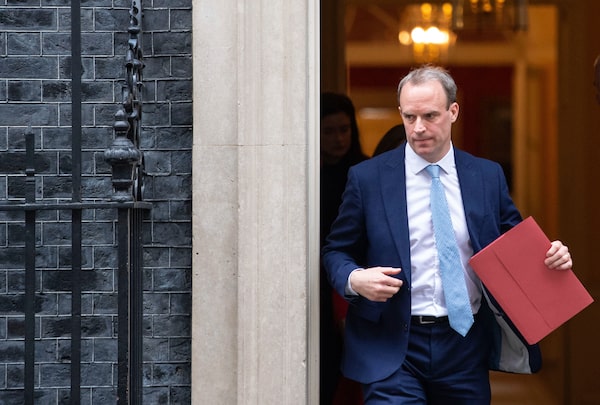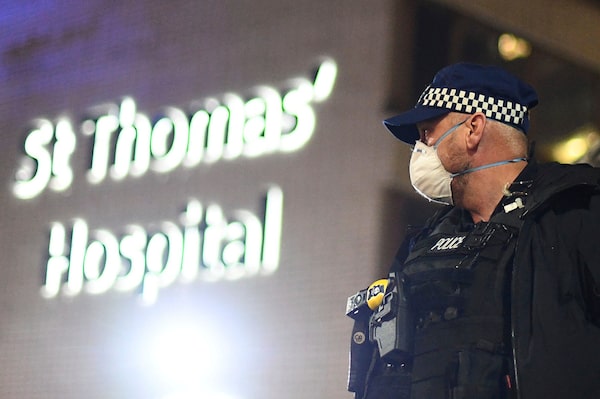Officials said Prime Minister Boris Johnson had taken a turn for the worse on Monday, and 'on the advice of his medical team, he has been moved to the intensive care unit at the hospital.'HENRY NICHOLLS/Reuters
British Prime Minister Boris Johnson’s medical condition has worsened and officials said he has been moved into intensive care in a London hospital.
Mr. Johnson was admitted to London’s St Thomas’ Hospital on Sunday, 10 days after testing positive for COVID-19. Officials at 10 Downing St. said at the time that he’d been admitted on the advice of his doctors because he continued to have a high temperature as well as other symptoms.
At first on Monday, officials played down the seriousness of Mr. Johnson’s illness and insisted that he could continue to run the government. In a message posted on Twitter Monday morning, Mr. Johnson said: “I’m in good spirits and keeping in touch with my team, as we work together to fight this virus and keep everyone safe.”
But by Monday evening, officials said the Prime Minister had taken a turn for the worse.
Coronavirus guide: Updates and essential resources about the COVID-19 pandemic
“Over the course of this afternoon, the condition of the Prime Minister has worsened and, on the advice of his medical team, he has been moved to the intensive care unit at the hospital,” a statement from Downing Street said. Officials added that Mr. Johnson remained conscious “at this time.”
They also said that he had been moved to the ICU at around 7 p.m. local time as a precaution “should he require ventilation to aid his recovery.”
Mr. Johnson, 55, deputized Foreign Secretary Dominic Raab to take over his duties.
The news has shaken the government and sent shock waves across the country. It has also raised more questions about how the government will manage the health crisis that has killed more than 5,000 people in Britain.
“He is a friend and, as Prime Minister, it is a bad moment. It is a bad moment for anybody,” said Sir Iain Duncan Smith, a senior Conservative member of Parliament who ran Mr. Johnson’s successful leadership campaign last summer.

Britain's Foreign Secretary Dominic Raab leaves a meeting in Downing Street, London, on Monday. Britain's Prime Minister Boris Johnson has been moved to the intensive care unit of a London hospital on Monday after his coronavirus symptoms worsened. Johnsons office says he is conscious and does not require ventilation at the moment. Johnson has asked Foreign Secretary Dominic Raab to deputize for him.Dominic Lipinski/The Associated Press
Labour Party Leader Sir Keir Starmer said on Twitter: “All the country’s thoughts are with the Prime Minister and his family during this incredibly difficult time.”
London Mayor Sadiq Khan said in a statement that he was “praying for the Prime Minister’s swift recovery.”
Only hours earlier, Mr. Raab had expressed confidence that Mr. Johnson would remain in charge of the government and oversee its response to the pandemic. However, officials said the Prime Minister had not chaired Monday’s daily meeting of the coronavirus response committee, which includes cabinet ministers and public health experts. Mr. Raab took his place instead.
Britain doesn’t have a deputy prime minister or a line of succession. However, Mr. Johnson had made it clear last week that Mr. Raab would be deputized if needed. If the Prime Minister dies in office, cabinet would have to recommend a successor to the Queen.
There had already been calls for Mr. Johnson to step back from his duties and focus on recovering. “Take care, boss. Get well. Come back fighting. But for now rest, look after yourself and let the others do the heavy lift,” junior cabinet minister James Duddridge said on Twitter on Monday.

A police officer stands outside St Thomas' Hospital in central London as British Prime Minister Boris Johnson was moved to intensive care after his coronavirus symptoms worsened on Monday. Johnson was admitted to St Thomas' hospital in central London on Sunday after his coronavirus symptoms persisted for 10 days. Having been in hospital for tests and observation, his doctors advised that he be admitted to intensive care on Monday evening.Victoria Jones/The Associated Press
The former head of the civil service, Robert Walter Kerslake, told the BBC that Mr. Johnson should pull back. “I think in the end if he’s not well, he will have to reflect on this because the job’s tough at the best of times and it’s doubly tough now,” he said.
Mr. Raab will now be thrust into co-ordinating the government’s coronavirus effort, which has already come under pressure. Britain has 51,608 confirmed cases of the virus and 5,373 people have died. Both numbers have been rising steadily although the growth rate has slowed in recent days. That could be an indication the country is close to the peak of the outbreak.
But Chris Whitty, England’s Chief Medical Officer, said on Monday that it was too early to be certain. He also said it was too soon to consider easing back on lockdown restrictions imposed by Mr. Johnson two weeks ago.
Mr. Raab too said any decision to ease the lockdown would have to wait until more data were available. “The risk is if we start to take our eye off the ball tackling coronavirus and getting through the peak ... we risk delaying the point [at which we can start] easing measures,” he told reporters.
Mr. Raab told the BBC Monday night that he will focus on ensuring that the “Prime Minister’s direction and all the plans for making sure we can defeat coronavirus and pull the country through this challenge will be taken forward."
He added that there was “an incredibly strong team spirit behind the Prime Minister and making sure that we get all of the plans that the Prime Minister has instructed us to deliver ... implemented as soon as possible."
Spain and Italy have also seen the outbreak there stabilize to some extent in recent days and officials have begun discussing how to pull back from lockdowns. In Austria, the government announced a gradual phasing out of its lockdown, with some shops set to reopen next week. And in Denmark, officials said schools could reopen on April 15 if the spread of the virus continues to stabilize.
Sign up for the Coronavirus Update newsletter to read the day’s essential coronavirus news, features and explainers written by Globe reporters.
 Paul Waldie
Paul Waldie